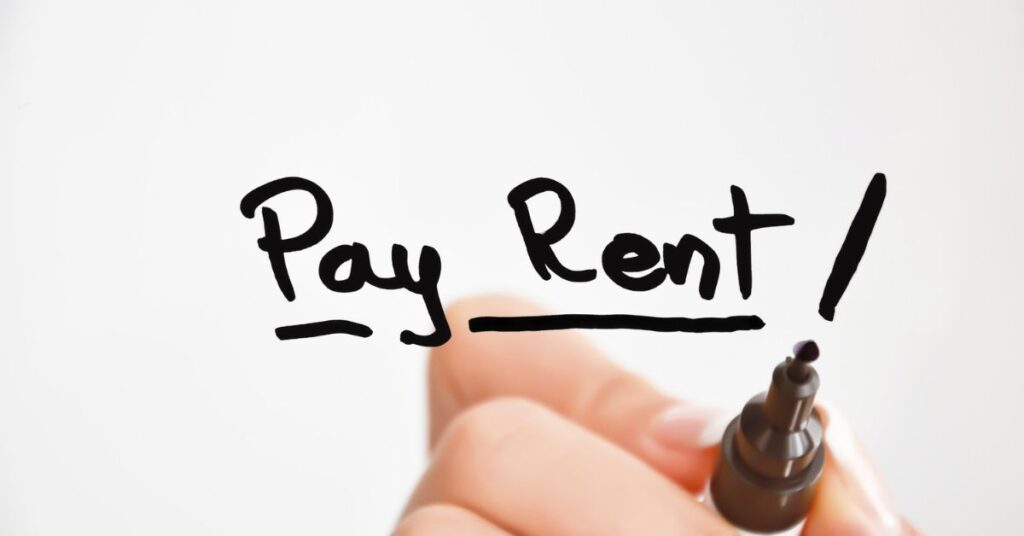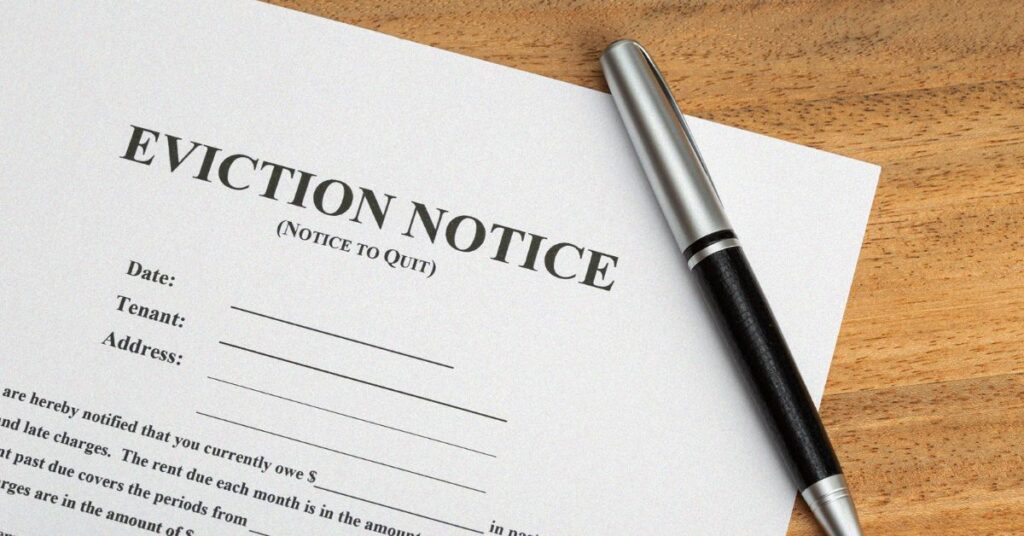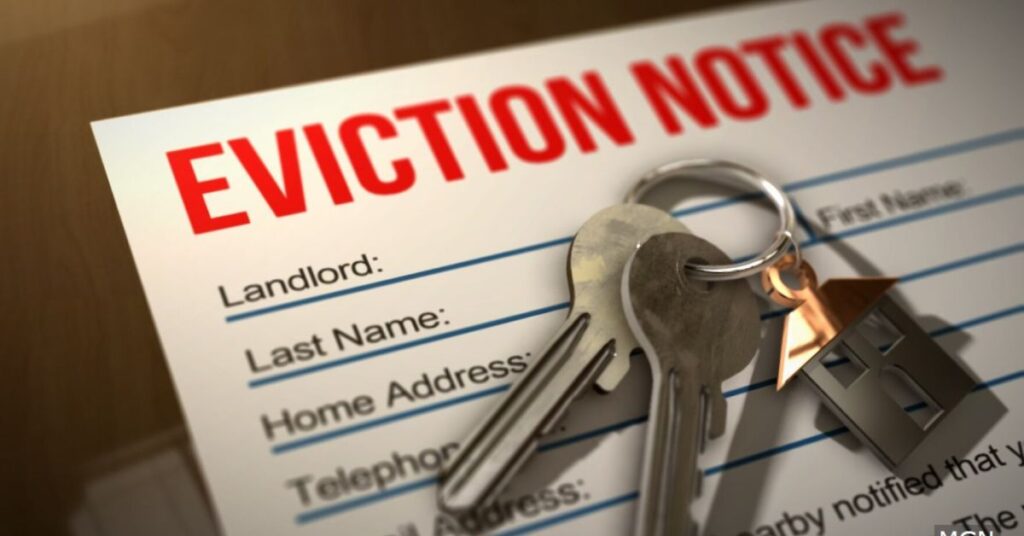Facing an eviction notice can be a daunting experience, raising numerous questions about rights and obligations. One common query among tenants is whether they must continue paying rent after receiving an eviction notice. This concern stems from the uncertainty surrounding the eviction process and its implications.
An eviction notice typically initiates a legal process aimed at removing a tenant from a property due to various reasons, such as non-payment of rent or violating lease terms. Despite receiving an eviction notice, tenants may wonder if they are still obligated to fulfill their rent payments.
However, it’s essential to recognize that until the eviction process concludes and a court order is issued, tenants are generally expected to continue paying rent as per their lease agreements.
Failure to do so could result in additional legal consequences, including potential eviction judgments and financial penalties. Therefore, tenants should seek legal advice and understand their rights and obligations to ensure they comply with the law while navigating the eviction process.
do I have to pay rent after the eviction notice bc?

Yes, typically, you are still required to pay rent after receiving an eviction notice. An eviction notice is the first step in a legal process, but until a court officially orders your eviction, your lease agreement remains in effect.
Failing to pay rent during this period can lead to further legal consequences and may exacerbate your situation. It’s essential to seek legal advice and understand your rights and responsibilities to navigate the eviction process effectively.
Late rent payment bc
Late rent payment can have serious consequences for tenants. It may result in late fees, damage to the tenant’s credit score, and strained relationships with landlords. Additionally, repeated late payments could potentially lead to eviction proceedings if not addressed promptly.
Therefore, tenants should strive to prioritize timely rent payments to maintain a positive rental history and avoid potential legal complications. If facing difficulties in paying rent on time, tenants should communicate with their landlords to discuss possible solutions and avoid further repercussions.
landlord ending month-to-month tenancy bc
When a landlord decides to end a month-to-month tenancy, it typically requires providing the tenant with proper notice as per local rental laws or the terms outlined in the lease agreement. This notice period can vary depending on the jurisdiction but commonly ranges from 30 to 60 days.
The landlord’s decision to end the tenancy may stem from various reasons, such as wanting to sell the property, renovate it, or simply not renew the lease.
Regardless of the reason, tenants should be aware of their rights during this transition period and ensure they comply with the terms specified in their rental agreement or local tenancy laws. Both landlords and tenants need to communicate effectively and follow legal procedures to facilitate a smooth transition out of the rental property.
do I have to pay rent after the eviction notice UK?
In the UK, if you receive an eviction notice, you are still generally required to pay rent until the eviction process is completed and you are legally required to vacate the property. Until a court orders your eviction and specifies a date by which you must leave the property, your tenancy agreement and its terms, including rent payments, remain in effect.
Failing to pay rent during this period could lead to further legal complications and may affect your ability to secure future rental accommodation. Therefore, it’s advisable to continue paying rent as agreed until the eviction process is finalized, or you reach a resolution with your landlord or through legal channels.
It’s essential to seek advice from a legal professional or housing authority if you’re unsure about your rights and obligations during an eviction process in the UK.
what to do when you receive an eviction notice

Receiving an eviction notice can be a stressful experience, but there are several steps you can take to address the situation:
Review the Notice Carefully
Take the time to read the eviction notice thoroughly. Note the reason for the eviction, the deadline for response, and any specific instructions provided.
Understand Your Rights
Familiarize yourself with your rights as a tenant. Research local tenant laws and regulations to ensure that the eviction notice is lawful and follows proper procedures.
Communicate with Your Landlord
Reach out to your landlord to discuss the eviction notice and explore potential solutions. Sometimes, issues can be resolved through open communication and negotiation.
Seek Legal Advice
If you’re unsure about your rights or need assistance in responding to the eviction notice, consider consulting with a legal professional specializing in housing law. They can guide your options and help you navigate the eviction process.
Respond Promptly
Depending on the type of eviction notice you receive, you may be required to respond within a specific timeframe. Make sure to adhere to any deadlines and provide a formal response if necessary.
Gather Evidence
If you believe the eviction notice is unjustified or based on false grounds, gather any evidence or documentation that supports your case. This may include lease agreements, payment receipts, or correspondence with your landlord.
Attend Court Hearings
If the eviction proceeds to court, make sure to attend all scheduled hearings and present your case effectively. Be prepared to provide evidence and testimony to support your defense.
The types of eviction notice
In the UK, there are several types of eviction notices that landlords may issue to tenants, depending on the circumstances:
Section 21 Notice
This is a no-fault eviction notice used by landlords to regain possession of their property at the end of a fixed-term or periodic tenancy. The landlord does not need to provide a reason for issuing this notice, but it must comply with certain legal requirements, such as giving the tenant at least two months’ notice and using the correct form.
Section 8 Notice
This is a fault-based eviction notice used when the tenant has breached the terms of the tenancy agreement, such as failing to pay rent or causing damage to the property. The landlord must specify the grounds for eviction outlined in Section 8 of the Housing Act 1988 and provide a minimum notice period, which varies depending on the reason for eviction.
Notice to Quit
This is a generic eviction notice used to terminate a periodic tenancy or a tenancy-at-will. It typically requires the tenant to vacate the property within a specified period, usually equal to the length of one rental period.
Notice of Possession
In cases where the tenant has fallen into arrears with their mortgage payments, the mortgage lender may issue a notice of possession to the tenant, informing them of the intention to repossess the property. The notice will specify a deadline by which the tenant must vacate the premises.
Notice to Quit for Assured Shorthold Tenancies
For assured shorthold tenancies in England and Wales, landlords can issue a notice to quit to terminate the tenancy. The notice period varies depending on whether it’s a periodic or fixed-term tenancy.
Emergency help for families getting evicted
If a family is facing eviction, there are several emergency assistance programs and resources available to help them:
Local Government Assistance
Many local governments offer emergency rental assistance programs or eviction prevention funds to help families facing eviction. Contact your city or county government offices to inquire about available resources and eligibility criteria.
Nonprofit Organizations
Numerous nonprofit organizations assist families at risk of eviction. Organizations like the Salvation Army, Catholic Charities, and local community action agencies may offer financial assistance, case management services, or temporary housing options.
Emergency Housing Programs
Some communities have emergency shelters or transitional housing programs that provide temporary accommodation for families facing homelessness. Contact local shelters or housing agencies to inquire about available options.
Legal Aid Services
Legal aid organizations provide free or low-cost legal assistance to tenants facing eviction. They can offer guidance on tenants’ rights, help negotiate with landlords, and provide representation in court if necessary.
State and Federal Assistance Programs
Families may qualify for assistance through state or federal government programs, such as the Emergency Rental Assistance Program (ERAP) or the Temporary Assistance for Needy Families (TANF) program. These programs provide financial assistance to low-income families for housing-related expenses.
Community Support Services
Churches, community centers, and social service agencies often provide emergency assistance to families in crisis. They may offer food assistance, utility bill payment assistance, or other forms of support to help families stay housed.
Family and Friends
Reach out to family members, friends, or other support networks for assistance during difficult times. They may be able to provide temporary housing, financial assistance, or other forms of support to help prevent eviction.
Does an eviction notice have to be served in person
| Method of Service | Description | Considerations |
| In Person | The landlord or authorized agent delivers the eviction notice directly to the tenant, ensuring personal receipt and potentially obtaining a signed acknowledgment. | – Provides direct interaction with the tenant, allowing for immediate clarification or discussion. – Offers the opportunity to verify the tenant’s identity and ensure the notice reaches the intended recipient. |
| Registered Mail | The eviction notice is sent via registered mail, requiring the tenant’s signature upon delivery to provide proof of receipt. | – Provides a reliable method of documenting delivery, as it requires the tenant’s signature. – Offers legal proof of service, which can be valuable in the event of disputes or legal proceedings. |
| Certified Mail | Similar to registered mail, certified mail requires the tenant’s signature upon delivery, providing proof of receipt. However, certified mail typically offers fewer tracking features compared to registered mail. | – Offers a level of tracking and documentation, although not as comprehensive as registered mail. – Provides evidence of attempted delivery and receipt, which can be useful in legal proceedings. |
| Regular Mail | The eviction notice is mailed to the tenant’s last known address through standard postal services. | – May be a cost-effective option for serving eviction notices. – Requires no special procedures or additional fees beyond standard postage. |
| Posting on Property | The eviction notice is conspicuously posted on the rental property, such as on the front door or in a visible location, ensuring that the tenant is made aware. | – Can be an effective method if the tenant cannot be reached through other means or if their whereabouts are unknown. – Some jurisdictions permit posting as an alternative method of service, but specific requirements must be met, such as ensuring the notice is securely attached and easily visible. |
| Electronic Service | In some jurisdictions, eviction notices may be served electronically, such as via email or through an online portal. | – Offers a convenient and efficient method of delivery, especially in cases where the tenant prefers electronic communication. – Requires compliance with specific legal requirements and consent from the tenant regarding electronic communication. |
| Personal Delivery | In certain situations, a process server or sheriff may be tasked with personally delivering the eviction notice to the tenant. This method often carries legal weight and ensures proper documentation of service. | – Provides a formal and authoritative method of delivery, often required for certain types of legal notices. – Offers additional assurance of compliance with legal requirements, as process servers are trained in proper service procedures. |
| Hand-Delivery by Landlord | The landlord delivers the eviction notice to the tenant by hand, personally ensuring that the notice is received. | – Allows for direct communication and clarification if needed. |
| Third-Party Delivery | The landlord uses a third-party delivery service to deliver the eviction notice to the tenant. | – Provides an alternative to personal delivery by the landlord, especially if direct contact is challenging. |
How to answer an eviction notice in Georgia
In Georgia, tenants have the right to respond to an eviction notice, and there are specific steps they can take to address the situation. Here’s how to answer an eviction notice in Georgia:
Review the Eviction Notice
Carefully read the eviction notice to understand the reason for the eviction and the deadline for responding. Ensure that the notice complies with Georgia’s landlord-tenant laws and includes essential information such as the reason for eviction, the date by which you must vacate the property, and any other relevant details.
Gather Evidence
If you believe the eviction notice is unjustified or contains inaccuracies, gather any evidence or documentation that supports your case. This may include lease agreements, payment receipts, correspondence with your landlord, or records of repairs or maintenance issues.
Consult with a Legal Professional
Consider seeking advice from a qualified attorney or legal aid organization specializing in landlord-tenant law. They can review your situation, explain your rights under Georgia law, and provide guidance on how to respond to the eviction notice effectively.
Prepare Your Response
Draft a formal response to the eviction notice, addressing each point raised by the landlord and providing any relevant evidence or arguments in your defense. Be sure to follow any specific requirements outlined in the eviction notice or Georgia’s legal procedures for responding to eviction actions.
File Your Response
File your response with the appropriate court within the specified timeframe indicated in the eviction notice. Ensure that you comply with all filing requirements and pay any necessary fees to avoid delays or dismissal of your case.
Attend the Court Hearing
If the eviction case proceeds to court, attend all scheduled hearings and present your case to the judge. Be prepared to provide evidence, testimony, and legal arguments supporting your defense against eviction.
Explore Settlement Options
Consider negotiating with your landlord to reach a mutually acceptable resolution outside of court. This may involve agreeing to pay outstanding rent, making repairs to the property, or signing a new lease agreement with revised terms.
Comply with Court Orders
If the court rules in favor of the landlord and issues an eviction order, comply with the terms of the order and vacate the property by the specified deadline. Failure to do so could result in additional legal consequences and enforcement actions by the landlord.
Read As: WHAT TIME OF DAY DOES THE SHERIFF COME TO EVICT? FIND OUT!
Does an eviction notice have to be served in person
In Georgia, eviction notices can be served in person, by mail, or by posting on the rental property. The method of service depends on the type of eviction notice and the circumstances surrounding the eviction. Here’s a breakdown of the different methods.
In Person
The landlord or their agent may personally deliver the eviction notice to the tenant. This method ensures direct communication and the opportunity for immediate clarification or discussion.
By Mail
Eviction notices can be sent to the tenant’s last known address via certified mail or first-class mail. Certified mail provides proof of delivery with a signature, while first-class mail does not require a signature but still provides documentation of mailing.
Posting on the Property
In cases where the tenant cannot be reached in person or by mail, the landlord may post the eviction notice conspicuously on the rental property. This method typically involves affixing the notice to the front door or another visible location.
It’s important to note that regardless of the method used, landlords must comply with Georgia’s legal requirements for serving eviction notices.
This includes ensuring that the notice contains specific information, such as the reason for eviction and the deadline for the tenant to respond.
Tenants who receive an eviction notice should carefully review the notice and seek legal advice if they have questions or wish to contest the eviction.
Frequently asked question
Do I have to pay rent after receiving an eviction notice?
Yes, generally, you are still required to pay rent until the eviction process is completed.
Can I stop paying rent after getting an eviction notice?
No, continuing to pay rent is usually required until a court orders your eviction and specifies a move-out date.
What happens if I don’t pay rent after receiving an eviction notice?
Failure to pay rent during the eviction process could lead to additional legal consequences and potentially expedite the eviction proceedings.
Can I negotiate with my landlord about rent payment after an eviction notice?
It’s possible to discuss rent payment arrangements with your landlord, but it’s essential to maintain communication and document any agreements reached.
Do I have any rights or options if I can’t afford rent after receiving an eviction notice?
You may have the right to seek financial assistance or explore alternative housing options. Consider consulting with a legal professional or local housing authority for guidance.
Can I challenge an eviction notice if I believe it’s unjustified?
Yes, you have the right to contest an eviction notice in court if you believe it’s unlawful or incorrect. It’s advisable to seek legal advice and explore your options for defense.
Conclusion
In conclusion, while receiving an eviction notice can be a daunting experience, tenants are generally still obligated to pay rent until the eviction process is completed and a court order specifies otherwise. Failing to fulfill rent obligations during this period can lead to additional legal consequences and potentially expedite the eviction proceedings.
However, tenants facing financial difficulties or disputing the eviction notice should seek legal advice and explore available options for assistance or defense. Effective communication with landlords and understanding one’s rights under the law are crucial for navigating the eviction process with diligence and clarity.

James, with 5 years of business experience, brings expertise to our website. His profile reflects a commitment to excellence and innovation in his field.







